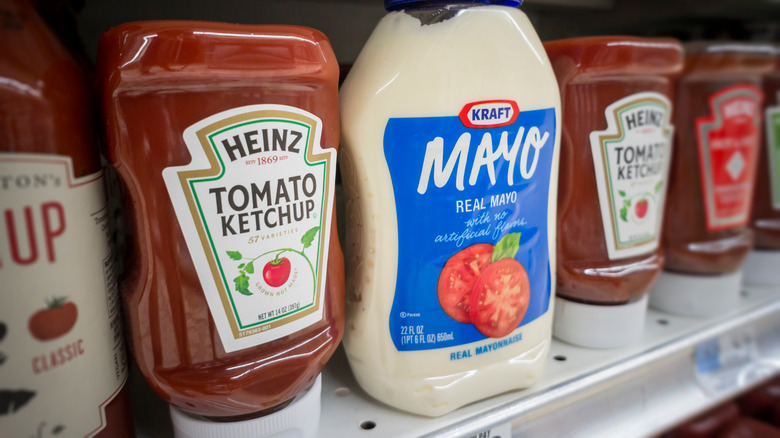The Products Most Affected By Kraft-Heinz's Supply Chain Issues
Much of the world continues to face food shortages due to supply chain issues. According to USA Today, the persistent COVID-19 virus and other issues have continued to plague suppliers and make things worse for large brands that depend on them. One such company is Kraft-Heinz, the producer of Ore-Ida products, Kraft mac & cheese, Classico sauces, Kool-Aid, Jell-O, and several others.
University of Rochester economist George Allesandria says that he expects these supply chain issues to persist into next year. Much of the U.S. is considered at low risk of spreading COVID-19 right now, per COVID Act Now, but huge outbreaks in China recently cause city lockdowns and ensuing manufacturing delays. This, along with the war in Ukraine's effects on global grain supplies and inclement weather damaging crops has caused the supply chain to continue to sputter onward with occasional shortages for many products.
Kraft-Heinz recently spoke on its own struggles related to the supply chain in prepared remarks issued with its latest financial results (via Food Business News).
Powdered beverages and frozen foods latest in short supply
Supply chain issues have been driving losses in some sectors for Kraft-Heinz, according to Food Business News. CEO Miguel Patricio shared that Kraft-Heinz's most supply-constrained products this past quarter were powdered beverages and frozen snacks and appetizers. As a result of this limited supply, these categories saw some of the brand's biggest share losses. Conversely, other products that were formerly facing similar issues have since been resolved like Lunchables and kids single-serve beverages, which saw some of the highest growth this quarter.
The brand says that it is managing these issues by continuing to increase its consumer data analysis to ensure that the supplies are available where demand is at its highest. The food conglomerate claims that implementing this practice has reduced the amount of out-of-stock inventory in stores by 40% in eight weeks.
Kraft-Heinz is also dealing with shortages of CO2 (carbon dioxide), which is used in various food processing capacities. Gas World says that the shortage in the U.S. was driven by the supplier Denbury's decision to switch its supplies into advanced oil well recovery. This disrupted the local market and created a shortage for many suppliers. Food Business News says that Kraft-Heinz has invested in advanced CO2 recycling and reclamation practices to extend its own supply and counter this shortage.

